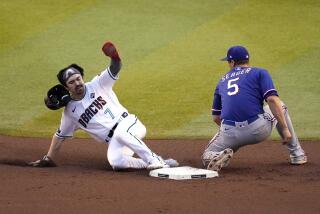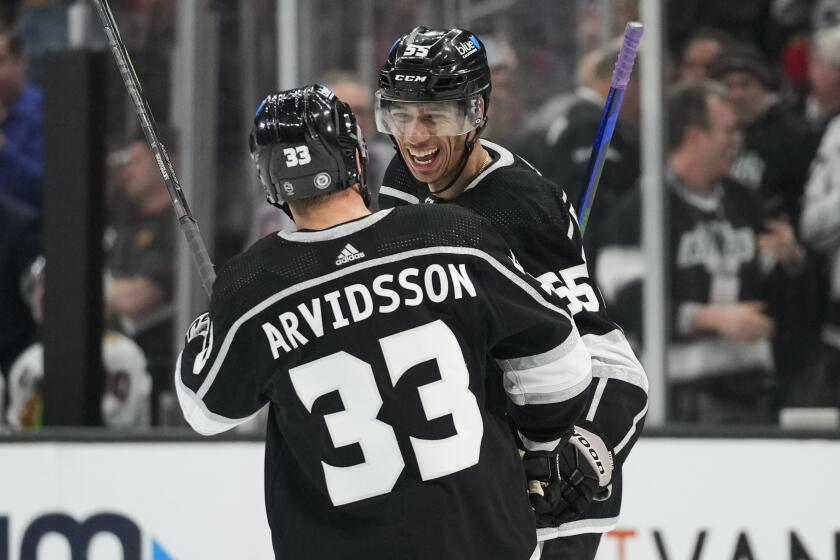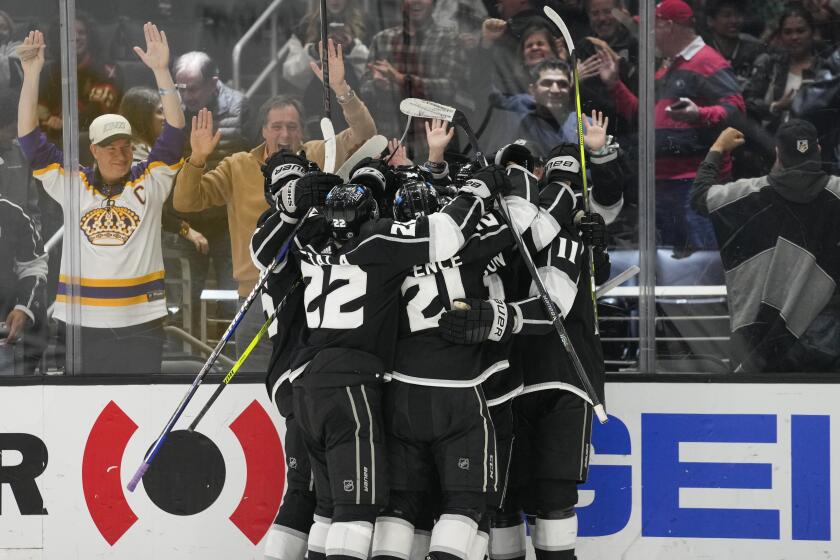Did Angels announcers make right call on Jered Weaver no-hitter?
Fans tuning in late to the Angels-Twins game Wednesday night on Fox Sports West might not have known Angels pitcher Jered Weaver was throwing a no-hitter.
They might have noticed had they been paying close enough attention to study the line score or other graphic, but anyone waiting for the verbal cue of hearing the words “no” and “hitter” uttered in a sequence would have to wait until after a fly ball had settled into the glove of right fielder Torii Hunter for the final out.
Victor Rojas, the Angels’ television play-by-play announcer, and analyst Mark Gubicza decided to stick to the unwritten baseball code that a mere mention of a no-hitter might jinx it.
Rojas, whose father, Cookie, played big league baseball for 15 years, said Weaver’s was the third no-hitter he’s called without actually saying the words.
“Some people say jinxes have no place in sports, but that’s just how I am,” Rojas said. “I didn’t move from my position after the third inning, I didn’t move any paper. I put my pens back in the same spot. That’s just who I am.”
Some fans agree with Rojas. Indeed, some sportswriters were criticized for blogging or posting messages on their Twitter accounts that Weaver had a no-hitter going. But other fans expect to be told what’s going on as they flip channels and happen upon history in progress.
“It’s a touchy situation,” Gubicza acknowledged. “It’s a great discussion to have. There’s no set rule book. I don’t have an issue about saying it, but my job as an analyst is just to describe why Jered is pitching so well.”
The broadcast team’s decision not to call it as they saw it was supported by the Angels.
“We do not have an official policy on how broadcasters should handle a game,” said Tim Mead, the Angels’ vice president of communications. “Former players might go with baseball superstitions, a traditional play-by-play guy may just call it. … It’s up to each broadcaster.”
Rojas and Gubicza were also supported by Dick Enberg, a Hall of Fame broadcaster who has called six no-hitters.
“You can tell the story without using the words,” said Enberg, himself a former Angels announcer.
Enberg, who now calls San Diego Padres games, said he decided last month when Padres starter Anthony Bass had a perfect game into the sixth inning that he would not say “no-hitter.”
It didn’t help. San Francisco Giants pitcher Tim Lincecum broke up the perfect game and no-hitter with an infield single and the Padres ended up losing.
Charley Steiner, a radio broadcaster for the Dodgers who has also done television baseball play-by-play, disagreed with Rojas and Enberg.
“Why are you keeping that a secret from your audience?” Steiner said. “In the 21st century we have this thing called the Internet. People in Swaziland know a no-hitter is going on. If you have those baseball superstitions from 40 years ago, OK, but do you not have some obligation to inform the audience?”
Jon Miller, another Hall of Fame baseball broadcaster, said he has no problem calling a no-hitter a no-hitter. “I feel like I have a responsibility to my audience, to the station, to the network, to say what’s going on,” Miller said.
“Plus, I want to maximize my audience. If someone hears from me about a no-hitter, he might call others or text or email and that helps my audience get larger. Some guys use all kinds of euphemisms, talking about ‘no runs, nothing at all,’ they make a game of it. I just think, if it’s a big story, mention it. But it’s a quaint old baseball thing. I don’t blame anybody for doing a game any way they want.”
Miller noted that Red Barber, baseball’s first preeminent baseball announcer, said, “We have to report on what’s going on.”
Barber said a manager once told him that if announcers had the power to “jinx a game, I’d have you on the bench with me.”
Unaware of what was being left unsaid in the broadcast booth, Weaver chose to ignore yet another superstition: that the pitcher throwing a no-hitter shouldn’t leave his spot on the bench between innings.
Between the eighth and ninth innings Weaver suddenly disappeared — for good reason, he explained after the game.
“I had to pee so bad it was unbelievable,” he said.
Now that’s telling it like it is.
twitter.com/mepucin
More to Read
Get our high school sports newsletter
Prep Rally is devoted to the SoCal high school sports experience, bringing you scores, stories and a behind-the-scenes look at what makes prep sports so popular.
You may occasionally receive promotional content from the Los Angeles Times.






